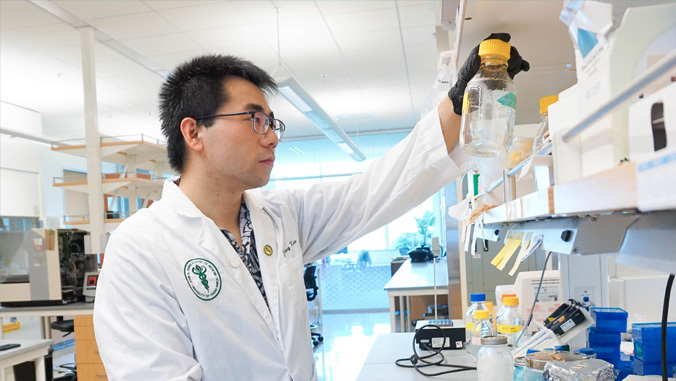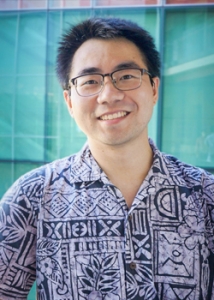
Research conducted by a University of Hawaiʻi student currently pursuing a dual MD and PhD degree is highlighted in a national journal.
As a graduate research assistant at the University of Hawaiʻi Cancer Center, Jiaming Xue earned his PhD in cell and molecular biology (CMB) in August. He is currently a second-year student at UH Mānoa’s John A. Burns School of Medicine (JABSOM). Xue’s research, published in Proceedings of the National Academy of Sciences, revealed important mechanisms regarding how asbestos fibers cause cancer.

Xue conducted his research over the past five years in the laboratory of his PhD mentor, Haining Yang, at the UH Cancer Center. Under Yang’s mentorship, Xue’s work revealed that upon asbestos exposure, human cells activate a process called autophagy that allows some cells to survive. These cells continue to live but carry the mutations caused by asbestos and later become malignant.
The study further demonstrated that commonly used antidepressant drugs having a secondary effect of inhibiting autophagy could reduce asbestos carcinogenesis. In the future, the scientific community will test whether such anti-depressive therapy may reduce cancer risks among individuals exposed to asbestos.
“Jiaming has worked very hard for the past few years. He often stayed late in the lab outside of office hours in the evenings and on the weekends to conduct his experiments, while at the same time attending school and studying medicine during the day,” said Yang. “Jiaming represents the high standard of students at UH with dedication and perseverance. I hope his success will inspire the future students to pursue a career of MD/PhD.”
Xue said, “It’s teamwork. I am grateful for all the support I have received from my colleagues in the lab, from the core facilities at the Kakaʻako campus, from my CMB program and from JABSOM. Most importantly, I would like to thank Dr. Haining Yang, who taught me the science and the love for science, and Dr. Michele Carbone, who pushed me to pursue an MD/PhD degree, and for his advice along the way.“
Xue plans to continue his medical studies at JABSOM and work to become a physician/scientist. “I want to be an oncologist. Hopefully, after my training, I can come back and practice in Hawaiʻi,” he said.
The research was directed by Yang and Carbone at the UH Cancer Center in collaboration with Tak W. Mak at the University of Toronto, as well as scientists at New York University, University of Iowa, University of Hiroshima (Japan) and University of Ferrara (Italy). The study was supported by a $2.5 million grant from the U.S. Department of Defense.

